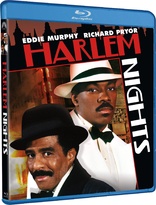Harlem Nights Blu-ray Movie
HomeHarlem Nights Blu-ray Movie 
Paramount Pictures | 1989 | 116 min | Rated R | Jun 28, 2022Movie rating
6.6 | / 10 |
Blu-ray rating
| Users | 3.8 | |
| Reviewer | 3.0 | |
| Overall | 3.0 |
Overview
Harlem Nights (1989)
During the 1930s, a New York City illegal gambling house owner and his associates must deal with strong competition, gangsters, and corrupt cops in order to stay in business.
Starring: Eddie Murphy, Richard Pryor, Redd Foxx, Danny Aiello, Michael LernerDirector: Eddie Murphy
| Comedy | Uncertain |
| Period | Uncertain |
| Crime | Uncertain |
Specifications
Video
Video codec: MPEG-4 AVC
Video resolution: 1080p
Aspect ratio: 1.78:1
Original aspect ratio: 1.85:1
Audio
English: DTS-HD Master Audio 5.1
German: Dolby Digital 2.0
French: Dolby Digital 2.0
Japanese: Dolby Digital 2.0
Subtitles
English SDH, French, German, Japanese
Discs
Blu-ray Disc
Single disc (1 BD)
Playback
Region A (B, C untested)
Review
Rating summary
| Movie | 4.0 | |
| Video | 2.5 | |
| Audio | 4.0 | |
| Extras | 1.0 | |
| Overall | 3.0 |
Harlem Nights Blu-ray Movie Review
Reviewed by Brian Orndorf June 29, 2022In the years leading up to the production of 1989’s “Harlem Nights,” star Eddie Murphy was viewed as basically unstoppable. He was young, hilarious, and participated in major box office hits, including the top-grossing movie of 1984, “Beverly Hills Cop.” Hollywood quickly learned Murphy could put butts in seats, even for mediocre endeavors, such as 1986’s “The Golden Child,” and he managed to turn a stand-up comedy feature (1987’s “Raw”) into event cinema. Murphy was everything, especially to Paramount Pictures, who looked to the actor to generate blockbusters, including 1987’s “Beverly Hills Cop II,” and especially 1988’s “Coming to America,” which wasn’t warmly received by critics and not expected to reach a large audience by the studio, but it became a word-of-mouth smash, proving Murphy didn’t need a gun or a fast mouth to inspire ticket sales. By 1989, Murphy could make any project he wanted to, and he did, putting himself in charge of “Harlem Nights,” which marked his directorial debut. Suddenly, the superstar was the principal creative force for a period gangster film, generating a major ego-stroke effort that also happens to be incredibly entertaining, periodically hilarious, and loaded with outstanding talent both in front of and behind the camera.
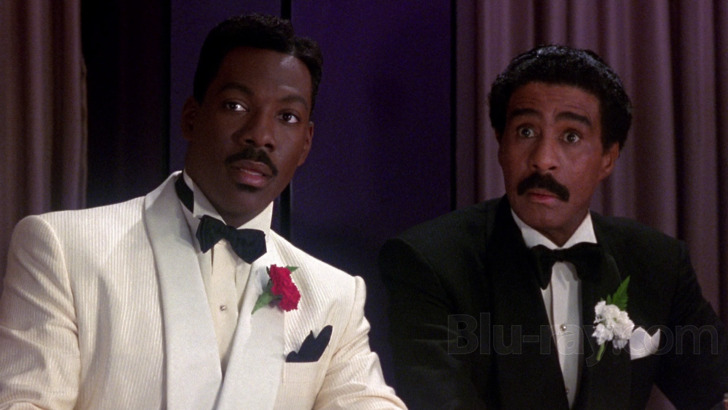
In 1938, the big action in Harlem is located inside Club Sugar Ray, with proprietor Sugar (Richard Pryor) looking to provide a jazzy environment of gambling, drinking, and sex for his customers, becoming a major hot spot. Sugar is supported by Quick (Eddie Murphy), his faithful ward, who looks to maintain order in the nightclub, unafraid of danger. Dealing with staff such as Bennie (Redd Foxx) and Vera (Della Reese), Sugar oversees nightclub operations, and business is booming, which attracts the attention of gangster Bugsy (Michael Lerner), who isn’t happy with the competition, sending Sergeant Phil (Danny Aiello) to push down on Sugar, demanding a large cut of the profits as a tax for doing business. Sugar and Quick aren’t receptive to the offer, looking to come up with a way to preserve their lifestyle and eliminate any threats, including Dominique (Jasmin Guy), a seductive woman who has her eye on Quick, clouding his judgement as games of gang violence begin.
“Harlem Nights” opens in 1918, establishing Quick’s killer instinct as a child, making his way into a backroom craps game run by Sugar, helping him out of a jam with an aggressive customer, using his familiarity with a pistol to do so. Quick doesn’t have parents and he’s living on the street, but he finds a home with Sugar, who responds to the child’s steeliness, raising him to be his second-in-command (Pryor is understated in the part, perhaps due to his early struggle with multiple sclerosis, but it works in this appealing performance). The screenplay (credited to Murphy) picks back up in 1938, with Club Sugar Ray firmly established in the community, allowing Murphy the director to create lively scenes of revelry and gaming table antagonisms, generating a festive mood for the nightclub scenes, backed by a jazzy score from Herbie Hancock. “Harlem Nights” is also supported by outstanding costuming achievements from Joe I. Tompkins, who’s handed a sizable budget to dress the acts in sharp outfits, reinforcing the luxury of life with Sugar and the exaggeration of a gangster picture, which this movie quickly becomes.
Conflict arrives with Bugsy, a ruthless underworld figure who doesn’t take kindly to competition, especially from a Black-owned nightclub that’s making a fortune every week. Bugsy wants to either get rid of Sugar or take most of his money, employing Phil to abuse his law enforcement access and intimidate Sugar, riling up Quick in the process. Murphy doesn’t have the greatest command of cinematic escalation, but he has a cast capable of making evil characters loathsome, with Lerner and Aiello bringing their special sauce to the production, hitting notes of malevolence with skill.
“Harlem Nights” tries to get something going with Bugsy’s aggression, but Murphy isn’t always interested in telling a straightforward story about gangland battles. He’s tuned into the comedic possibilities of the effort, and while he’s careful to give himself the best clothes, loving close-ups, and assorted action opportunities, Murphy also shares the screen with incredible talent, including Foxx, who delivers cantankerous roasting as Sugar’s near-blind gaming associate, and Reese is a force of nature as Vera, a brothel madame who doesn’t back down from a fight. Robin Harris and Charlie Murphy also appear, and Arsenio Hall arrives mid-movie for an extended cameo as an emotionally distraught sibling to one of Bugsy’s dead associates, swearing revenge on Quick, who’s been framed for the murder. Hall goes full cartoon, and it works superbly, adding a bit of insanity to “Harlem Nights,” which has plenty of barbed banter (dripping with profanity) and joking around, but rarely indulges silliness, which Murphy skillfully executes.
Harlem Nights Blu-ray Movie, Video Quality 
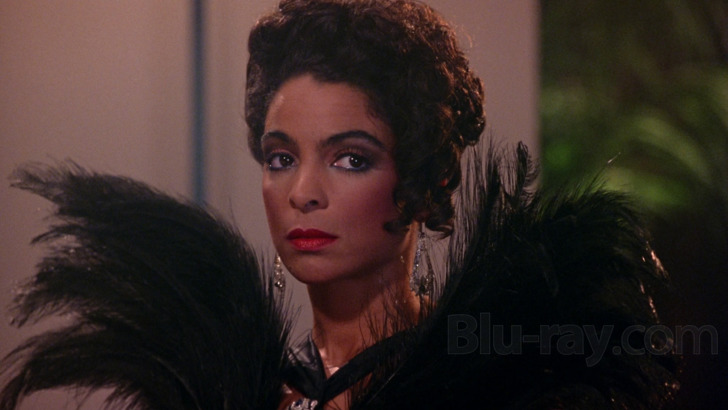
The AVC encoded image (1.78:1 aspect ratio) presentation of "Harlem Nights" is sourced from an older scan of the feature. Detail is softer, but some facial particulars retain texture, and achievements in costuming are mildly appreciable. Dimension isn't ideal, losing expanse with street tours and interiors, which are loaded with decorative additions. Color handles adequately but not remarkably, lacking snap with period hues and interior tours. Clothing carries a bit more potency. Brighter lighting sources are generally clipped. Delineation is acceptable. Grain looks processed, with some chunkier stretches. Source is in decent condition.
Harlem Nights Blu-ray Movie, Audio Quality 
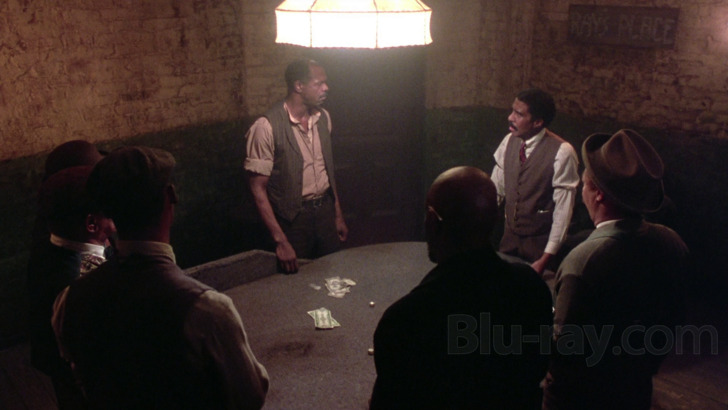
The 5.1 DTS-HD MA mix delivers a clear understanding of dialogue exchanges, defining the assortment of acting choices here, with the loose, improvisational nature of some scenes remaining intelligible. Music tends to dominate, offering a sharp jazz sound with crisp percussion and horns, and scoring cues provide mild support in the surrounds for this primarily frontal listening event. Sound effects supply crisp gunshots, and while low-end response isn't significant, some weight is understood with explosions and body blows. Atmospherics handle crowd bustle adequately.
Harlem Nights Blu-ray Movie, Special Features and Extras 
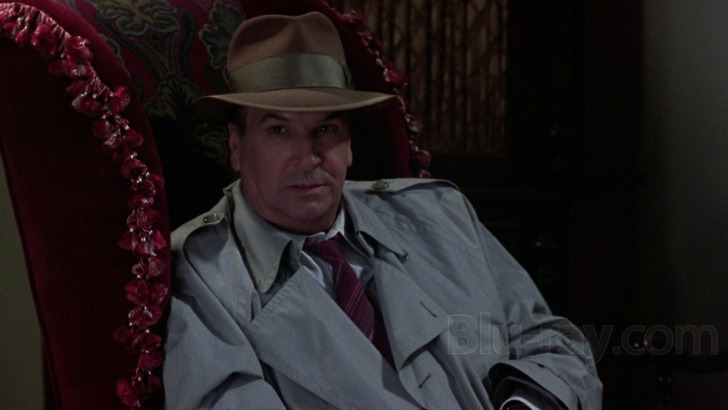
- A Theatrical Trailer (1:33, HD) is included.
Harlem Nights Blu-ray Movie, Overall Score and Recommendation 
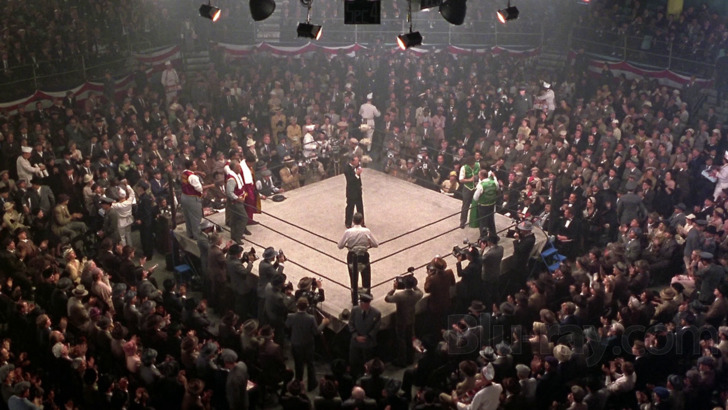
Murphy looks to tangle up the second half of "Harlem Nights," cooking up a scheme for Sugar and the crew, where they take on Bugsy's control of the city, looking to disrupt his operations during a major boxing fight featuring champ Jack (Stan Shaw), whose stutter is played for laughs, exposing some unnecessary mean-spiritedness from the production. Plot replaces the casual atmosphere of the feature, with Murphy trying to give the endeavor a memorable conclusion, working with gangster cinema tradition and his large cast to spotlight a major effort to undermine Bugsy's operations. It connects as intended, but it also identifies the occasional tonal divide in "Harlem Nights," which isn't cohesive, but remains engaging due to the power of the acting and the slickness of technical achievements. Murphy (who hasn't directed anything since 1989) isn't a tremendous stylist, but he knows to get out of the way at times, letting the cast bring their own special personalities to the picture. This is definitely an Eddie Murphy movie meant to play up the screen appeal of Eddie Murphy (his awkward love scene with Guy, which would've been cut by any other helmer, is proof of that), but there's a lot of charm here, and hearty laughs.
Similar titles
Similar titles you might also like

The House
2017

Johnny Dangerously
1984

Analyze This
1999

Oscar
1991

My Blue Heaven
Warner Archive Collection
1990

Mafia!
Jane Austen's Mafia!
1998

The Crew
2000

Ocean's Thirteen 4K
2007

The Naked Gun 2½: The Smell of Fear
1991

The Happytime Murders
2018

Moonwalkers
2015

The Naughty Nineties
1945

Search Party
2014

Easy Money
1983

Girl Most Likely
2013

Last Vegas
2013

Who's Harry Crumb?
Retro VHS Collection
1989

The Big Bounce
2004

The Whole Nine Yards
2000

The Whole Ten Yards
2004
